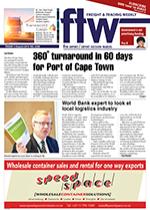Africa has no choice but to focus on increasing free trade within its boundaries considering the turbulence in the global trading environment. According to Minister of Trade and Industry, Rob Davies, South Africa has been very involved in the development of the African Continental Free Trade Agreement (AfCFTA), despite not signing with the original 44 countries in March this year. Speaking at the Exporters’ Club Western Cape recently, Davies said there was never any doubt that South Africa would sign the agreement, but it was dependent on the completion of several annexes. “We have a constitutional and legal order that requires all international agreements to be complete – and in the case of AfCFTA we were not in agreement with the other countries that the annexes had been finalised.” He said in July President Cyril Ramaphosa had finally agreed that the necessary processes had been completed and he – along with five other countries – had signed the agreement. “Almost the entire continent is now part of this agreement that is fast nearing the point of introduction,” he said. “It has to be ratified by each individual country’s parliament. In our case, we don’t foresee any challenges with this process.” He said South Africa had never had any problems with the content or the substance of the agreement. “We played a critical role in the text that was adopted by AfCFTA.” It would become the world’s biggest free trade area, said Davies. “It’s no secret that there has been disruption in the global trading order. The World Trade Organisation (WTO) has its back to the wall.” Having recently returned from a visit to Washington in the US, Davies said the Americans were clearly on a path of protectionism. “The Trump administration is blocking appointments of the appellate body of the WTO and by the end of the year that body will not be able to sit and adjudicate on cases,” he said. At the same time, countries like South Africa were seeing their exports to the US become less certain and security of deals was no longer a given. “In that context, the significance of regional integration becomes important and, even more so, continental integration. It’s a process that’s of great strategic importance to South Africa.” He said with the African continent already the destination of nearly a quarter of all the country’s exports – of which at least 54% was valueadded manufactured goods – Africa’s importance was not to be scoffed at. “In 2017 our exports to Africa totaled R311 billion. We still run a sizeable surplus in our favour with only R109bn of imports.”

